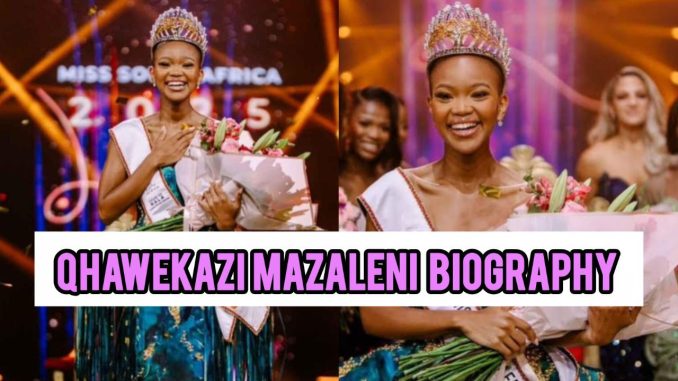
Qhawekazi Mazaleni Biography
Qhawekazi Mazaleni was born on August 15, 2001, in Eastern Cape, South Africa. She grew up between Dutywa and East London and later lived in Sundowner, Randburg as she pursued studies and work. From childhood she showed curiosity about language and learning. That interest led her to study speech, language and hearing therapy at Stellenbosch University, where she trained to help children and adults who struggle to communicate. Qhawekazi Mazaleni is 24 years old as of 2025.
Qhawekazi’s life blends culture, language and care. She grew up in a family that encouraged multilingualism and a respect for local languages. Her home language is isiXhosa, and she is comfortable speaking English and Afrikaans while learning other South African languages. That mixture of roots and learning shapes how she speaks about education and inclusion: she believes children learn best when taught in their home language and when families and schools work together to build reading and thinking skills. Her personal story — from a small Eastern Cape town to the national stage — makes her case for home-language learning feel both practical and deeply personal.
Qhawekazi Mazaleni Career
Qhawekazi trained as a speech therapist and began work focused on early childhood language development. Her career so far is small in years but rich in purpose. As a clinician and student, she worked directly with children who have communication challenges. One notable example of her practical work is a children’s book she wrote in isiXhosa to help a nine-year-old patient with cerebral palsy learn to read and count in a home language they could understand.
That book and other small projects show how she turns professional skills into tangible help for families and schools. Her clinical practice and her academic study at the University of Pretoria — where she is doing a Master of Arts in Speech-Language Pathology focused on autism — give her the training to speak with authority about early learning and inclusive education.
Beyond one-on-one therapy, Qhawekazi has pushed for broader change. She believes that South Africa’s low literacy levels among young children are tied to the language mismatch in classrooms and the shortage of resources in local languages. In public talks and during the Miss South Africa contest she has argued the country must invest in home-language books and teacher training so Grade 4 learners can read for meaning. That emphasis shows how a clinician’s view of learning can become a policy message: support the child’s first language, support families, and then the rest of education becomes easier. Her mixed role as clinician, author and advocate has made her voice credible with parents and educators who want practical solutions.
Qhawekazi also has experience in public-facing roles. She entered her first pageant at Beaconhurst High School in East London and later took part in national competitions and training that prepared her for Miss South Africa. Pageantry gave her coaching in public speaking, media work and civic project planning. She used those skills not to chase glamour alone but to amplify the educational issues she cares about. By combining clinical work with public advocacy, she models a new kind of career path where professionals step into public life to scale impact.
Qhawekazi Mazaleni Personal Life
Qhawekazi is the youngest of three girls. Her family background blends Xhosa and Sotho roots, with her father working at Eskom and her mother in the Department of Education. That family life shaped her belief in service and in practical solutions for children. She keeps much of her private life out of headlines, but interviews and public posts show that she values community, learning and humility. Her teachers and colleagues describe her as curious, calm and patient — qualities that suit both clinical work and public leadership.
She is multilingual and continues to learn. Her ability to speak isiXhosa, English and Afrikaans, and to study Sepedi and isiZulu, helps her operate across South Africa’s complex linguistic landscape. This skill is more than symbolic: it allows her to talk to parents, teachers and community leaders in ways that build trust. Her published isiXhosa children’s book also shows how she uses language as a bridge between clinical practice and cultural life. That bridge is central to her personal style and to the message she will carry as Miss South Africa.
Qhawekazi Mazaleni Miss South Africa 2025 Winner
On Saturday, October 25, 2025, in a live finale at the SunBet Arena at Time Square in Pretoria, Qhawekazi Mazaleni was crowned Miss South Africa 2025. Her win was emotional and widely covered by national media. She stood among nine finalists and won when judges praised her clarity, focus and the way she connected her personal work to national problems like youth unemployment and low literacy. The event was hosted by well-known presenters and featured performances that made the night festive while highlighting how the Miss South Africa platform aims to combine culture with leadership.
During her final question-and-answer session Qhawekazi spoke about the practical skill she would use to empower young people: start with what you have. She asked the youth to use available tools and resources to impact communities, rather than waiting for opportunity to be handed to them. In earlier impact statements, as part of the pageant’s Top 9, she argued that the root causes of unemployment must be addressed and that improving reading skills is a key starting point. Those answers showed how she intended to use the Miss SA platform: not just for appearances but to campaign for inclusive education and to provide home-language learning resources. Her specific plans and calm delivery impressed judges and viewers alike.
Winning Miss South Africa brings a large prize package and a public role. The Miss South Africa organisation has for recent years offered a prize package valued at more than R3 million, often including a cash prize, a sponsored car and a furnished apartment for the year of reign. Beyond material prizes, the title gives the winner access to coaching, networks and a national platform to work with schools, businesses and government on projects. Qhawekazi’s focus on home-language literacy and on building reading resources places her in a position to partner with publishers, NGOs and education departments to deliver the kind of books and training she champions.
Her first year as Miss South Africa will be watched closely. She will be expected to travel, meet stakeholders and run visible projects that show results. For a speech therapist whose work often happens one-on-one, this transformation into national leadership will be a test of scale. If she uses the Miss SA platform well, she could move from helping individual children to influencing national curriculum choices and distributing hundreds of home-language books. That kind of shift is exactly what she described on stage when she said she wants to push for “inclusive education” and build tools parents and teachers can use immediately.
Conclusion
Qhawekazi Mazaleni’s rise from the Eastern Cape to become Miss South Africa 2025 shows how deep professional purpose can meet public influence. As a trained speech therapist and an author of an isiXhosa children’s book, she brings real work experience to a role that often leans on symbolism. Her public message centers on home-language learning, early literacy and practical empowerment for youth. The Miss South Africa crown gives her reach; her background gives her credibility. The question now is how fast and how well she can turn a national platform into practical, measurable gains for the children and communities she cares about.
FAQs
What does Qhawekazi want to focus on as Miss South Africa?
She plans to focus on inclusive education, particularly early reading in home languages, producing books in indigenous languages, and supporting parents and teachers with practical literacy tools.
What are Qhawekazi’s qualifications and current studies?
She holds a Bachelor’s degree in Speech, Language and Hearing Therapy from Stellenbosch University and is pursuing a Master of Arts in Speech-Language Pathology at the University of Pretoria with a focus on autism.
Did Qhawekazi publish a children’s book?
Yes. She wrote and published an isiXhosa children’s book inspired by a young patient with cerebral palsy to support home-language learning and early literacy.

Fred Justin is a journalist and writer who focuses on local food and cooking. For nine years he has reported on neighborhood restaurants, farmers’ markets, recipes, and food trends, helping readers find great places to eat and understand how food is made. He holds a BSc and an MSc in Food Science and Biotechnology, which gives him scientific expertise in ingredients, food safety, and production that strengthens his writing.
Leave a Reply